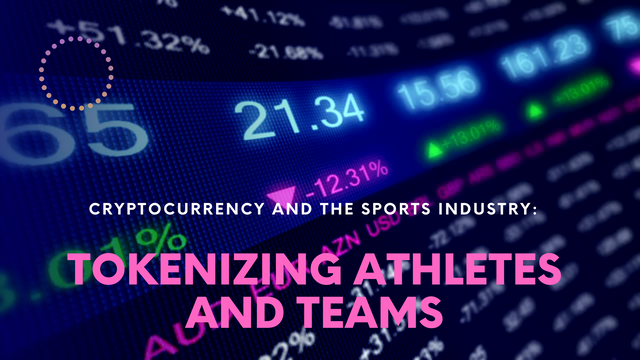Hello everyone I am @shahariar1 mod of Steem of Animals Community.I am From #Bangladesh
 |
|---|
Cryptocurrency is currently a rapidly growing business, and its symbiosis with the sports industry turns fans’ involvement in the process into a complete revolution. Blockchain is now the nebulous enabler of tokenization at the heart of this transition. From converting contracts, sports assets, or shares of future athlete revenues into NFTs and offering engagement and financial possibilities in terms of investment, those applications offer new opportunities for the sports industry.
Tokenization
Tokenization means the process of converting a real-world asset into a digital token, which will be situated on a blockchain. In the context of the sports industry, this could refer to the tokenization of as simple of an agreement as a player’s contract up to or as complex as a team’s revenue streams. They can also be directly purchased or sold on different blockchain markets or traded on different blockchain markets in order to gain liquidity and new investments. For instance, people can buy shares in a player for his future earnings by using tokens or a popularity vote.
.png) |
|---|
Financial Flexibility: Tokenization means that an athlete can offer future revenues or other valuable stakes as tokens with which capita can be attracted. It can give short-term capital to those willing to engage in sporting activities and create a publicity for products within a short span of sporting activities without requiring sponsorship funds.
Enhanced Fan Engagement: Currently, both teams and individual athletes can launch their own fan tokens, which are good for access to unique content, voting on certain decisions, or purchasing team merchandise. This provides fans a better opportunity to interactively engage himself or herself with updates and recent happenings.
Global Reach: Tokenization of assets makes it possible to purchase them from anywhere around the world so that people such as teams and athletes can extend their services to the outside world markets.
 |
|---|
Case Studies
As we shall shortly see, several high-profile sports organizations have already implemented tokenization. For instance, Juventus Football Club and Paris Saint-Germain football clubs of Europe, and the AS Roma club have engage with blockchain –based fan tokens. These tokens enable fans to participate in voting on club-related matters, receive content and be rewarded.
In the world of basketball, it was the NBA’s Sacramento Kings, who have been some of the first to accept Bitcoin for tickets and merchandise sales in 2014. Since then, the employment of cryptocurrencies in sports has been given the green light and different teams began to implement blockchain technologies on ticketing, merchandise, and even fan voting.
Key Issues
While the potential benefits of tokenization are significant, there are also challenges to consider:
Regulatory Uncertainty: Cryptocurrencies and digital tokens are still not clearly regulated. Current and forthcoming challenges require teams and individual athletes to work sensitive to legal requirements of the host country as well as international laws.
Market Volatility: As was said before, cryptocurrencies are characterized by high fluctuation in their prices, which adds risks to investors and emitters of tokens. That is why proper risk management strategies are so critical to avoid these risks.
Security Concerns: Although, blocking technology is very safe from hacking and fraud it has not eliminated these challenges. Being able to protect the introduced digital tokens and the platforms through which the tokens will be traded and exchanged is highly relevant and fundamental to the structure of the proposed prototype.
end
.png) |
|---|
The future of tokenization is bright for the industry of sports. In the coming years, advanced developments based on blockchain technology will create new forms of fans’ interaction with their favorite teams and athletes as well as generate additional revenues and make an investment approach more accessible. Smart contracts can be a way to automate some or all token transactions, for instance, improving efficiency and boosting the transparency of the whole process.
However, non-fungible tokens are emerging as another important layer of possibilities now, what they can do, and how you can use them. They can be used to authenticate and sell isolated tokenized digital goods such as exclusive sports souvenirs, moments, or endeavors. This creates new possibilities for fans to engage with their sport, and for clubs to commercialize their identity.
Therefore, the tokenization of athletes and teams is emerging as a new kind of phenomenon in the field of sports, which is based on blockchain. There are, of course, problems to solve, but the rewards in the realms of financial innovation, fan engagement, and overall universality are huge. It is from this interaction with fans and other key stakeholders that sport businesses become integrated systems as the industry continues to embrace and explore these technologies.
Support @bangla.Witness by Casting your witness vote
VOTE @bangla.witness as witness

X promote link : https://x.com/Shahari73599011/status/1844065597107413108?t=oqcbci3dv5v9VwipsyRRXg&s=19
Downvoting a post can decrease pending rewards and make it less visible. Common reasons:
Submit
Note:- ✅
Regards,
@theentertainer
Downvoting a post can decrease pending rewards and make it less visible. Common reasons:
Submit